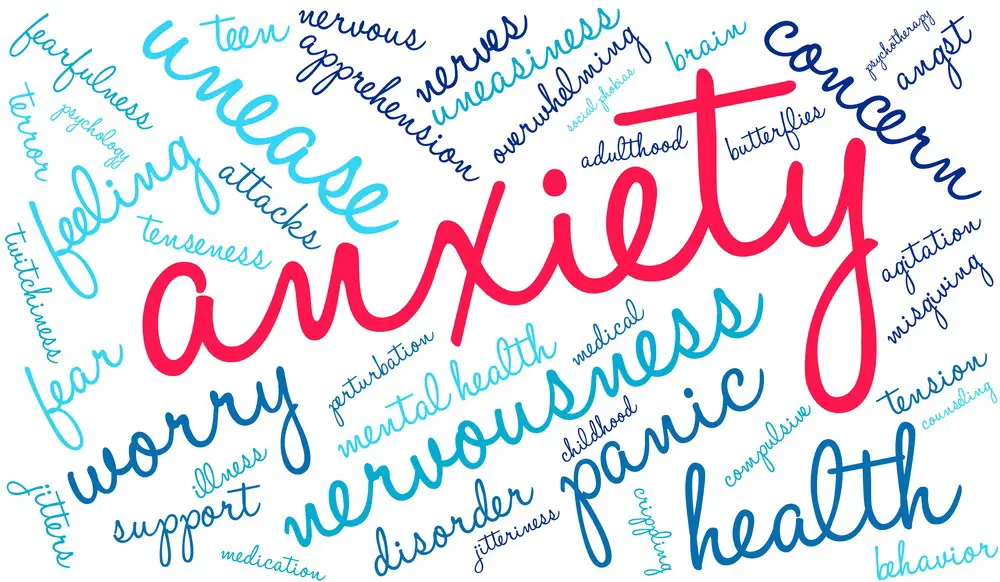As a BetterHelp affiliate, we receive compensation from BetterHelp if you purchase products or services through the links provided
High-functioning anxiety is a condition that can often go unnoticed due to the ability of those affected to maintain an outward appearance of success and accomplishment. However, these individuals may struggle beneath the surface with various issues that make their day-to-day lives significantly more challenging. Recognizing the signs of this type of anxiety is crucial to develop effective strategies for coping and obtaining appropriate support.
This article will discuss seven telltale signs of high-functioning anxiety to help you identify whether you or someone close to you might be experiencing it. From excessive worry and overthinking to relationship difficulties stemming from anxiety, recognizing these signs can pave the way for understanding and managing this often-misunderstood condition.
Key Takeaways
- Recognizing signs of high-functioning anxiety can lead to better-coping strategies and support.
- Symptoms include excessive worry, perfectionism, relationship challenges, and physical manifestations.
- Treatment options exist, and seeking help from professionals can significantly improve daily life.
 Understanding High-Functioning Anxiety
Understanding High-Functioning Anxiety
High-functioning anxiety is a term used to describe individuals who experience anxiety but can still perform well in various aspects of their lives. Although not an official diagnosis in the realm of mental health, it is widely recognized as a subset of anxiety that can have a significant impact on an individual’s well-being.
People with high-functioning anxiety may appear to have it all together on the surface, but they often struggle with persistent worry and fear. This can lead to constant overthinking and a desire for perfectionism, which may make them successful in various areas of life, such as work and relationships.
The symptoms of high-functioning anxiety are similar to those of generalized anxiety disorder (GAD) but differ in how they manifest. Individuals with high-functioning anxiety often manage their symptoms effectively, allowing them to maintain a facade of normalcy. This can make it challenging to detect high-functioning anxiety, as these individuals tend to mask their struggles and may even deny that they have a problem.
Some common signs of high-functioning anxiety include over-preparation, difficulty making decisions, constant self-criticism, and feeling overwhelmed with daily tasks. As a coping mechanism, people with high-functioning anxiety might also be excessively punctual, expertly organized, or well-versed in conflict resolution.
While it’s essential to recognize the signs of high-functioning anxiety, it’s also crucial to understand that this condition may develop gradually or can stem from underlying mental health issues. Seeking professional help from a mental health expert, such as a therapist or a psychologist, can benefit individuals experiencing high-functioning anxiety. Early intervention and support can help them develop healthier coping mechanisms and work towards improving their overall mental health.
 Sign 1: Excessive Worry and Overthinking
Sign 1: Excessive Worry and Overthinking
Elevated Levels of Worry
Individuals with high-functioning anxiety often experience elevated levels of worry. They may be constantly anxious about various aspects of their life, from work-related tasks to personal relationships. This heightened nervousness often leads to continuous racing thoughts, making it difficult for them to find peace and relaxation.
While everyone faces worry from time to time, in the case of high-functioning anxiety, these feelings are persistent and can interfere with daily life. Some common signs of excessive worry might include difficulty concentrating, irritability, tension, and restlessness.
Perpetual Overthinking
Perpetual overthinking is another sign of high-functioning anxiety. Overthinking is the continuous process of excessively analyzing, evaluating and rehashing thoughts. Such individuals often struggle with decision-making, as they constantly second-guess themselves.
These racing thoughts can lead to mental exhaustion and reduced productivity over time. For example, people with high-functioning anxiety may lie awake at night, plagued by thoughts about upcoming deadlines, social situations, or past conversations.
In conclusion, excessive worry and overthinking are two signs of high-functioning anxiety. While everyone experiences worry and rumination to some degree, those with high-functioning anxiety face these feelings much more, which can significantly impact their quality of life. It’s important to recognize these signs and seek appropriate support if necessary.
 Sign 2: Perfectionism and Fear of Failure
Sign 2: Perfectionism and Fear of Failure
The Drive for Perfection
Individuals with high-functioning anxiety often exhibit perfectionism. This drive for perfection can manifest in various aspects of a person’s life, such as work, relationships, and personal goals. They may set unattainable goals and standards, constantly striving to achieve them. This relentless pursuit of perfection can lead to feelings of inadequacy and self-criticism.
Perfectionism in people with high-functioning anxiety originates from a deep-rooted fear of failure. They may believe that any flaw or mistake will result in negative consequences, such as rejection or disapproval from others. As a result, they put immense pressure on themselves to meet these unrealistic expectations.
Fear as a Motivating Factor
Fear of failure acts as a motivating factor for those with high-functioning anxiety, pushing them to work harder and longer. This fear may stem from previous experiences or consequences of not meeting expectations. It may also be associated with negative self-talk, where individuals constantly criticize and doubt their abilities. Unfortunately, the fear of failure can lead to a constant cycle of anxiety, as they feel compelled to achieve their goals and fear they won’t be able to.
In their drive for success, people with high-functioning anxiety might overlook the value of self-care and balance in their lives. This can exacerbate anxiety symptoms and make it more difficult for them to achieve well-being. Finding ways to manage this fear of failure is crucial for those with high-functioning anxiety, allowing them to achieve their goals without sacrificing their emotional health.
 Sign 3: Relationship Challenges Due to Anxiety
Sign 3: Relationship Challenges Due to Anxiety
Impact on Personal Relationships
People with high-functioning anxiety often face relationship challenges. Due to their anxious thoughts and behaviors, they may struggle to form and maintain healthy connections with others. For instance, these individuals might worry excessively about how they are perceived, leading to a fear of judgment and rejection. It’s not uncommon for them to overthink social situations and retreat into themselves to manage their anxiety.
At the same time, those with high-functioning anxiety often experience mood fluctuations. These changes in temperament can make it difficult for their friends and family members to understand and empathize with them. Because of this, relationships may become strained or even fractured.
Work-Related Stress and Relationships
High-functioning anxiety can also impact professional relationships. In the workplace, these individuals may experience feelings of inadequacy, leading to excessive self-doubt and self-criticism. When tasks are completed, they might continuously second-guess their work quality, causing delays or misunderstandings with colleagues.
Additionally, people with high-functioning anxiety may struggle to balance work and personal life. They may prioritize their professional responsibilities over their well-being and relationships, resulting in feelings of isolation.
In summary, high-functioning anxiety can manifest as complex relationship challenges. Understanding and addressing anxiety’s impact on personal and professional relationships is essential for fostering positive connections and improving overall mental health.
 Sign 4: Irritability and Restlessness
Sign 4: Irritability and Restlessness
Manifestations of Irritability
Irritability is one of the common symptoms of high-functioning anxiety. Individuals with high-functioning anxiety may experience an increased sensitivity to stressors, leading to heightened emotional reactions. In turn, this can result in:
- Becoming easily frustrated or annoyed by minor issues
- Difficulty tolerating noise or distractions
- Experiencing short-tempered outbursts
- Feeling overwhelmed by multiple demands
Understanding Restlessness
Restlessness is another common symptom of high-functioning anxiety. It can manifest in various ways, including:
- Feeling on edge and unable to relax
- Constantly shifting positions or fidgeting
- Struggling to remain still for extended periods
- A persistent need to keep busy or multitask
Both irritability and restlessness can be challenging to manage. Individuals experiencing these symptoms should consider exploring coping strategies and seeking professional support if necessary.
 Sign 5: Difficulty Relaxing and Sleep Issues
Sign 5: Difficulty Relaxing and Sleep Issues
The Battle with Relaxation
Individuals with high-functioning anxiety often find it challenging to relax. Their minds constantly race, contemplating various tasks and potential problems. They may have difficulty quieting their thoughts during leisure activities or downtime. This inability to relax impacts their mental well-being and can exacerbate physical symptoms of anxiety, such as muscle tension and fatigue.
Sleep Disorder’s Connection to Anxiety
Sleep problems are frequently associated with high-functioning anxiety. Insomnia, a common sleep disorder, is characterized by difficulty falling asleep, staying asleep, or waking up too early. People with high-functioning anxiety can experience insomnia or other sleep disturbances, which can subsequently impair their daily functioning and overall quality of life.
Moreover, a vicious cycle can develop between anxiety and sleep problems. As anxiety levels increase, sleep is disrupted, and lack of sleep can exacerbate anxiety symptoms, creating a feedback loop that may be difficult to break.
To improve sleep quality for individuals with high-functioning anxiety, lifestyle changes, and professional support may be beneficial. Incorporating relaxation techniques, maintaining a regular sleep schedule, and seeking guidance from a mental health professional can help address anxiety and sleep-related issues.
Sign 6: Muscle Tension and Physical Symptoms
Physical Impact of Anxiety
High-functioning anxiety can cause tense muscles and other physical manifestations. Individuals experiencing this form of anxiety are frequently on edge, even if they seem at ease. As a result, their muscles tighten and remain contracted. Over time, this constant activation may lead to chronic muscle tension, headaches, and discomfort.
Muscle tension is just one symptom of high-functioning anxiety. Physical symptoms may also include:
- Gastrointestinal issues
- Sleep disturbances
- Rapid heartbeat
- Excessive sweating
Recognizing Physical Symptoms
To better manage high-functioning anxiety, it’s essential to recognize the physical signs. Paying attention to muscle tension, increased heart rate, or other physical symptoms can act as an early warning system, helping individuals with anxiety to cope more effectively.
By learning to identify physical symptoms and practicing techniques to combat them (such as deep breathing, exercise, or massage), individuals with high-functioning anxiety can achieve a better quality of life. Remember, addressing these symptoms is essential for maintaining overall health and well-being.

Sign 7: Distress and Impairment in Daily Life
Understanding Distress
High-functioning anxiety can lead to feelings of distress that might not be immediately obvious or severe. This type of distress can manifest in different ways, such as constant worrying, physical symptoms like headaches or stomachaches, and emotional distress like irritability or mood swings. Though individuals with high-functioning anxiety usually cope and manage their daily responsibilities, the distress experienced is still significant.
Impairment in Work and Social Functioning
The impact of high-functioning anxiety on one’s daily life may not be as noticeable as in other anxiety disorders, but it still impairs work and social functioning. For instance, an individual might become overly perfectionistic or procrastinate due to persistent worrying; this leads to inefficiencies at work. In social situations, they may appear withdrawn or constantly seek reassurance, which can strain relationships.
In conclusion, high-functioning anxiety, though seemingly manageable, causes distress and impairment in daily life. Understanding and recognizing these signs is crucial in effectively addressing and treating this mental health concern.

Treatment Options for High-Functioning Anxiety
Medication can be a helpful tool in managing high-functioning anxiety. Various medications, such as antidepressants and anti-anxiety medications, can help alleviate symptoms. It is crucial to consult a healthcare professional before starting any medication.
Mental health professionals play an integral role in providing guidance and support. A psychiatrist, psychologist, or therapist can offer expert advice and create a personalized treatment plan for individuals with high-functioning anxiety.
Cognitive behavioral therapy (CBT) is a popular and effective treatment option. This therapy focuses on changing negative thought patterns and behaviors, allowing individuals to manage their anxiety better. CBT can be conducted in individual or group sessions.
In addition to CBT, other forms of therapy can be beneficial for high-functioning anxiety. This may include exposure therapy, which helps individuals face and overcome their fears, or dialectical behavior therapy (DBT), which focuses on emotional regulation and interpersonal effectiveness.
Psychotherapy is another treatment approach that can effectively address the root causes of high-functioning anxiety. This method may involve exploring past experiences or traumas and examining any contributing factors to the development of anxiety.
As each experiences high-functioning anxiety differently, it is essential to explore various treatment options to determine the most effective treatment plan. A combination of therapies, professional support, and medication may be necessary to manage high-functioning anxiety successfully.
Conclusion
High-functioning anxiety can manifest in various ways, even though individuals with this condition may appear to be in control and successful. It is essential to recognize the signs and seek appropriate help when needed.
Firstly, constant worry and overthinking are common indicators of high-functioning anxiety. People experiencing this may often be preparing for the worst, leading to a heightened state of stress and tension. Sleep disturbances, such as insomnia, are another sign and can contribute to overall mental and physical health decline.
Secondly, individuals with high-functioning anxiety may display a relentless need for perfectionism, preventing them from ever feeling satisfied with their accomplishments. This continuous striving can result in burnout and an inability to enjoy personal or professional achievements.
Furthermore, procrastination and indecision can be symptoms and coping mechanisms for people struggling with this type of anxiety. They may avoid making decisions or taking action due to overwhelming pressure and fear of failure.
It is also common for those with high-functioning anxiety to experience physical symptoms, such as heart palpitations and gastrointestinal issues. Additionally, they might exhibit emotional symptoms like irritability or frequent mood swings. Finally, seeking constant reassurance from others can be another sign, as individuals may not feel capable of tackling challenges independently.
In conclusion, recognizing these signs of high-functioning anxiety is crucial for seeking timely interventions and support. While living with this condition can be challenging, resources and treatments are available to help manage symptoms and improve overall well-being.
Frequently Asked Questions

What are the symptoms of high-functioning anxiety in adults?
High-functioning anxiety in adults manifests through symptoms such as constant worrying, overthinking, feeling restless, difficulty focusing, irritability, and sleep disturbances. People with high-functioning anxiety often appear successful in their daily lives but experience internal struggles with anxiety-related symptoms.
How does perfectionism relate to high-functioning anxiety?
Perfectionism is a common trait in individuals with high-functioning anxiety. They often set unrealistically high standards for themselves and feel intense pressure to meet these expectations. Their fear of failure and judgment can lead to excessive self-criticism, procrastination, and increased anxiety.
What is the difference between high-functioning anxiety and regular anxiety?
High-functioning anxiety is not an official diagnosis but a term used to describe individuals who experience anxiety but continue to function well in activities of daily living. In contrast, regular anxiety can impair daily functioning, work, and relationships. High-functioning anxiety may not be as easily noticeable as frequent anxiety, making it challenging to recognize and address.
How can I recognize the red flags of high-functioning anxiety?
Some red flags of high-functioning anxiety include excessive worry, constant need for reassurance, repetitive behaviors, difficulty saying no, fear of judgment, over-preparation, and persistent self-doubt. Recognizing these signs can help individuals seek appropriate support and interventions to manage their anxiety effectively.
What are the possible root causes of high-functioning anxiety?
High-functioning anxiety may have various root causes, such as a family history of anxiety, trauma or adverse childhood experiences, an untreated anxiety disorder, or chronic exposure to high stress. Sometimes, a combination of these factors can contribute to the development of high-functioning anxiety.
How does procrastination relate to high-functioning anxiety?
Procrastination can be a symptom of high-functioning anxiety resulting from the fear of failure and the pressure to meet high standards. Individuals with high-functioning anxiety may experience “analysis paralysis,” where they become overwhelmed and put off completing tasks. This behavior can create a cycle of anxiety and avoidance, perpetuating feelings of stress and anxiety.
As someone who has battled mental health challenges while dealing with a narcissistic ex-partner who consistently breaks court orders and refuses to allow me to communicate with our children, I understand the importance of self-care and seeking help when needed. I take Lexapro to manage my symptoms and take long daily walks to stay grounded and centered. To support others who may be facing similar challenges, I write articles about mental health and narcissism. My goal is to provide a source of encouragement and guidance to those struggling with complex relationships and mental health issues.
- Breaking the Silence: Why Men’s Mental Health Matters More Than Ever - April 15, 2025
- How to Transform a Home’s Patio Space into a Relaxing Space - March 23, 2025
- 5 Strategies to Use a Cell Phone to Help Manage Your Stress - March 23, 2025
This site contains affiliate links to products. We will receive a commission for purchases made through these links.


 Understanding High-Functioning Anxiety
Understanding High-Functioning Anxiety Sign 1: Excessive Worry and Overthinking
Sign 1: Excessive Worry and Overthinking Sign 2: Perfectionism and Fear of Failure
Sign 2: Perfectionism and Fear of Failure Sign 3: Relationship Challenges Due to Anxiety
Sign 3: Relationship Challenges Due to Anxiety Sign 4: Irritability and Restlessness
Sign 4: Irritability and Restlessness Sign 5: Difficulty Relaxing and Sleep Issues
Sign 5: Difficulty Relaxing and Sleep Issues
